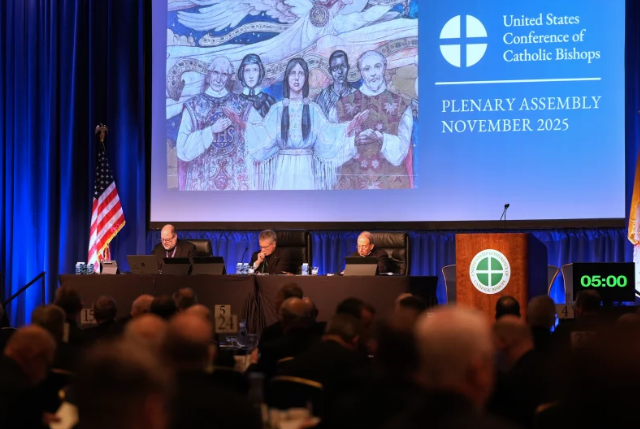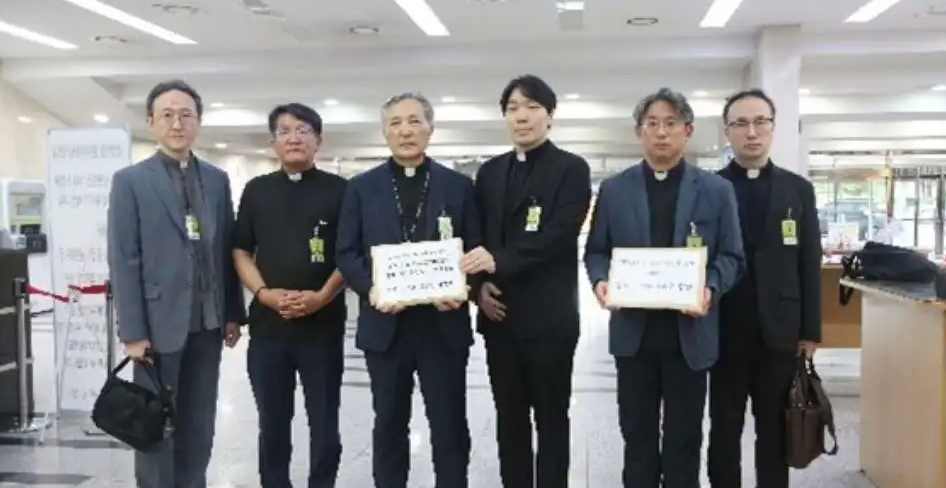
All News

TN Hospital Denies Woman Sterilization Surgery, Citing Her “Sacred Fertility”
A Tennessee woman says Ascension Saint Thomas Hospital Midtown cancelled her scheduled sterilization procedure while she was already undergoing pre-surgery preparation, after the hospital’s Catholic Ethics Oversight Committee intervened. The piece links the incident to Tennessee’s Medical Ethics Defence Act, which allows providers and medical centers to refuse procedures that conflict with their moral beliefs. It presents the case as an example of how religiously based hospital governance can shape access to contraception-related care, especially in a state with highly restrictive abortion laws.
By: Chris Walker

Days after MAiD trial ends, Archbishop urges vigilance for Catholic hospitals
Archbishop Richard Smith urged Catholics to remain vigilant in defending the mission of Catholic healthcare. The piece explains that the case centers on whether publicly funded Catholic hospitals in British Columbia can continue operating according to their religious ethics, particularly under the 1995 Master Agreement between the province and the Denominational Health Association. In his World Day of the Sick homily, the Archbishop describes Catholic hospitals as central to the Church’s healing ministry and argues that their mission and integrity should be recognized, valued, and protected within the wider provincial health system.
By: The B.C. Catholic

Accommodating Catholic health care presence and conscience
This article illustrates how Catholic healthcare has long been part of Canada’s publicly funded health system and that its continued presence depends on preserving space for institutional and individual conscience. The piece also claims that newer federal standards are increasing pressure on healthcare workers by expecting them to raise euthanasia with eligible patients and, in some cases, make effective referrals. It presents these developments as part of a broader shift from accommodation toward coercion in matters of conscience.
By: The B.C. Catholic

B.C. government struck compromise with assisted dying policy, court hears
This article reports on evidence presented in the British Columbia Supreme Court during a legal dispute over how the province’s assisted-dying policy applies to faith-based hospitals. The court heard that the provincial government reached a “compromise” policy intended to balance access to medical assistance in dying with respect for religious objections by some hospitals, particularly Catholic facilities that do not provide MAID on site. Government witnesses described efforts to ensure patients approved for MAID can receive the procedure without forcing faith-based institutions to act against their beliefs. The testimony also highlighted the role that faith-based facilities, including St. Paul’s Hospital in Vancouver, play in the broader health system and the complexity of maintaining both access and institutional identity.
By: Tara Carman

Are most hospitals in Tulsa controlled by the Catholic Church?
This fact brief argues that the claim that most Tulsa hospitals are controlled by the Catholic Church is inaccurate. It states that while one-third of Tulsa hospitals are associated with Catholic organizations, Catholic directives directly apply only to hospitals owned by those organizations, which it identifies as five hospitals, or 28% of Tulsa hospitals. The piece also notes that Catholic hospitals make up a larger share of general care hospitals in Tulsa than in Oklahoma or the United States overall, and highlights that these institutions are governed by the Ethical and Religious Directives for Catholic Health Care Services.
By: Matthew Yin

HHS Takes Comprehensive Action to Enforce Conscience Rights and Protect Human Life
This press release announces new steps by the U.S. Department of Health and Human Services to protect health care workers and institutions who object to certain medical procedures for religious or moral reasons. The agency says it will more actively enforce existing federal laws that allow doctors, nurses, and hospitals to refuse participation in services such as abortion, sterilization, and assisted dying. As part of this effort, the department issued a formal warning to the State of Illinois, arguing that a state law requiring referrals for abortion conflicts with federal conscience protections. The announcement frames these actions as necessary to prevent discrimination against health care providers who choose not to take part in procedures that conflict with their beliefs.
By: HHS Press Office

Families want Canadian provinces to end MAID opt-out policy for faith-based hospitals
Catholic-affiliated hospitals, including St. Paul’s Hospital in Vancouver, prohibit participation in MAID due to religious doctrine, requiring patients who are approved for the procedure to be transferred to non-religious facilities. Patient advocates and families argue that these transfers can cause additional suffering and distress, particularly for patients who are seriously ill or near death. The article highlights cases where patients were moved shortly before dying, prompting legal action by advocacy groups who claim the policy violates patients’ rights and undermines access to publicly funded health care services. Supporters of the policy argue that religious institutions should be permitted to operate in accordance with their beliefs while continuing to provide other essential medical services. The issue is now before the courts.
By: Caroline Barghout

France’s assisted suicide bill and the forced secularization of Catholic healthcare
This article argues that France’s proposed assisted-suicide law would threaten the religious freedom and continued operation of Catholic hospitals, care homes, and nursing homes if they refuse to permit euthanasia or assisted suicide on their premises. The piece states that the bill, already adopted by the French National Assembly and under review in the Senate, would require all healthcare and medico-social institutions, public and private, to allow the practice regardless of their religious identity, with refusal treated as a criminal offence. It further claims that directors of Catholic institutions could face prosecution, fines, and loss of public funding, and presents this as an unprecedented denial of institutional conscience.
By: The Catholic Herald

Euthanasia in France: Catholic Institutions Seriously Threatened
This article reports on concerns among Catholic groups in France over a proposed national euthanasia and assisted-dying law that would require all healthcare institutions to permit euthanasia on their premises. Legal experts and advocates, including the European Centre for Law and Justice, argue that under the draft text, Catholic hospitals, nursing homes, and care facilities could face criminal prosecution, fines, or loss of public funding if they refuse to allow euthanasia. Critics say the bill would force faith-based institutions to act against their moral and religious commitments or face penalties ranging up to prison sentences for directors. Supporters of the Catholic position warn this represents an unprecedented threat to the freedom of religious health-care providers and stress the need to defend institutional conscience rights.
By: FSSPX NEWS

MAiD for mental illness: ‘Canada is pioneering resignation'
The article reports on the first-reading of Bill C-218, which aims to block the planned expansion of medical assistance in dying to people whose only underlying condition is mental illness. Liberal and Bloc Québécois MPs signalled they are likely to oppose the bill and instead wait for the findings of a joint parliamentary committee on MAiD set to convene in early 2026, while opponents of the expansion argued that safeguards are already failing and that Canada is not prepared to extend eligibility to mental illness alone.
By: Quinton Amundson

On the USCCB's revised “ethical and religious directives" for catholic hospitals
U.S. Catholic bishops voted to formally ban gender-affirming care at Catholic-affiliated hospitals by adopting revised ethical and religious Directives. The updated directives prohibit "surgical or chemical" interventions aimed at changing a person’s sex characteristics. The bishops approved the revisions at their plenary assembly, and the new policy will guide how Catholic hospitals and providers respond to requests for gender-affirming medical care. Each bishop will be responsible for implementing the policy for their dioceses. Catholic leaders emphasized that the care of all patients should be delivered with dignity and respect, even as the ban takes effect. On the same day, progressive religious leaders issued a statement in support of transgender, intersex, and nonbinary people.
By: John M. Grondelski

U.S. bishops officially ban gender-affirming care at Catholic hospitals
U.S. Catholic bishops voted to formally ban gender-affirming care at Catholic-affiliated hospitals by adopting revised ethical and religious Directives. The updated directives prohibit "surgical or chemical" interventions aimed at changing a person’s sex characteristics. The bishops approved the revisions at their plenary assembly, and the new policy will guide how Catholic hospitals and providers respond to requests for gender-affirming medical care. Each bishop will be responsible for implementing the policy for their dioceses. Catholic leaders emphasized that the care of all patients should be delivered with dignity and respect, even as the ban takes effect. On the same day, progressive religious leaders issued a statement in support of transgender, intersex, and nonbinary people.
By: The Associated Press

Doctors alarmed by Health Canada's push for MAiD talks with patients
Some Canadian doctors are raising concerns about a Health Canada “Model Practice Standard” that would encourage physicians and nurse practitioners to raise the possibility of medical assistance in dying (MAiD) with patients they believe might be eligible and receptive. Critics argue that the guideline could amount to “compelled speech” and influence vulnerable patients toward considering euthanasia. A Health Canada spokesperson said the standard was developed with input from regulatory bodies and clinicians, but reiterated that the federal government cannot force provinces or health authorities to adopt it.
By: Terry O’Neill

Legislators in Victoria want to force Catholic hospitals to abort babies
Lawmakers in Victoria, Australia are proposing legislation that would compel publicly funded Catholic hospitals to provide abortion and contraception services, effectively eliminating long-standing conscientious objection protections. These hospitals currently operate under Catholic ethical guidelines that prohibit abortion and certain forms of contraception. Proponents of the bill argue that medical care should not be influenced by religious doctrine, claiming that public funding requires universal access to all legal medical procedures. Opponents warn that forcing Catholic facilities and their staff to perform abortions would violate moral and religious freedoms, causing emotional distress for healthcare workers and undermining institutional integrity.
By: Nancy Flanders

Catholic hospital system sued for not providing ’emergency abortion’ as ‘standard of care’
California-based Catholic health system, Dignity Health (operating 41 hospitals), is being sued by a patient who alleges that after suffering pre-viable preterm rupture of membranes (PPROM) twice, she was not offered an abortion by two of the system’s hospitals. The lawsuit, filed in California Superior Court on September 25 2025, accuses Dignity Health of violating state law governing emergency care, civil rights protection, and other statutes by not providing what the plaintiff claims is the “standard of care” in her condition.
By: Gina Christian

Growing Market Power Among Catholic Hospitals Restrains Access to Reproductive Health Care
The article describes how the growing consolidation of Catholic health systems in the U.S. is affecting access to reproductive health services. It reports that Catholic hospitals now comprise a significant share of hospital beds and systems, and because they follow the Ethical and Religious Directives (which limit or forbid services like abortion, many contraceptive methods, fertility treatments, and certain miscarriage management options), their market power means fewer alternative providers are available in many communities. The piece argues that this creates access barriers for patients, especially in states where Catholic hospitals are the primary or only option.
By: Bailey Sanders, Barak Richman, Kierra B. Jones, Andrea Ducas, Samuel Doernberg

Ascension Health investments appear to reject Vatican guidance
A report by National Nurses United (NNU) claims that Ascension Health’s investments—in its Master Pension Trust—include hundreds of millions of dollars in industries that conflict with the Vatican’s 2022 guidance Mensuram Bonam: Faith-Based Measures for Catholic Investors. These holdings cover weapons manufacturers, alcohol, gambling, tobacco, mining, fossil fuels, environmental-harmful banks, and exploitative labor sectors. NNU urges Ascension to increase transparency, publish its investment criteria, divest from problematic sectors, and release lists of holdings and divestments.
By: National Nurses Organizing Committee

Ascension Saint Agnes nurses to protest Catholic hospital chain’s unfaithful financial investments
Bishop Pius Moon Chang-woo and representatives of several Catholic organizations in South Korea formally opposed proposed revisions to the Maternal and Child Health Act. The amendments would allow broader access to abortion pills, revise language to neutralize abortion, and include abortion services under national health insurance. The Catholic leaders argued the changes would devalue fetal life and marginalize the balance between a woman’s rights and the fetus’s right to life; they pledged to revitalize a national pro-life movement to uphold ethical standards and support pregnant women through Catholic health networks
By: National Nurses Organizing Committee

Study: Hospitals acquired by Catholic health systems unlikely to eliminate obstetrics
A national study compared over 700 first-time hospital acquisitions between 2009 and 2022 to see how operations change when hospitals are acquired by Catholic vs. non-Catholic systems. The study found that Catholic-system acquisitions are less likely than non-Catholic ones to eliminate obstetrics (labor and delivery) units. Catholic-owned systems also tend to preserve or expand mission-oriented services such as charity care and chaplaincy.
By: Amanda Brewster, Hector Rodriquez, Becky Staiger

Korean Catholic Bodies oppose move to ease abortions
Bishop Pius Moon Chang-woo and representatives of several Catholic organizations in South Korea formally opposed proposed revisions to the Maternal and Child Health Act. The amendments would allow broader access to abortion pills, revise language to neutralize abortion, and include abortion services under national health insurance. The Catholic leaders argued the changes would devalue fetal life and marginalize the balance between a woman’s rights and the fetus’s right to life; they pledged to revitalize a national pro-life movement to uphold ethical standards and support pregnant women through Catholic health networks
By: UCA Report